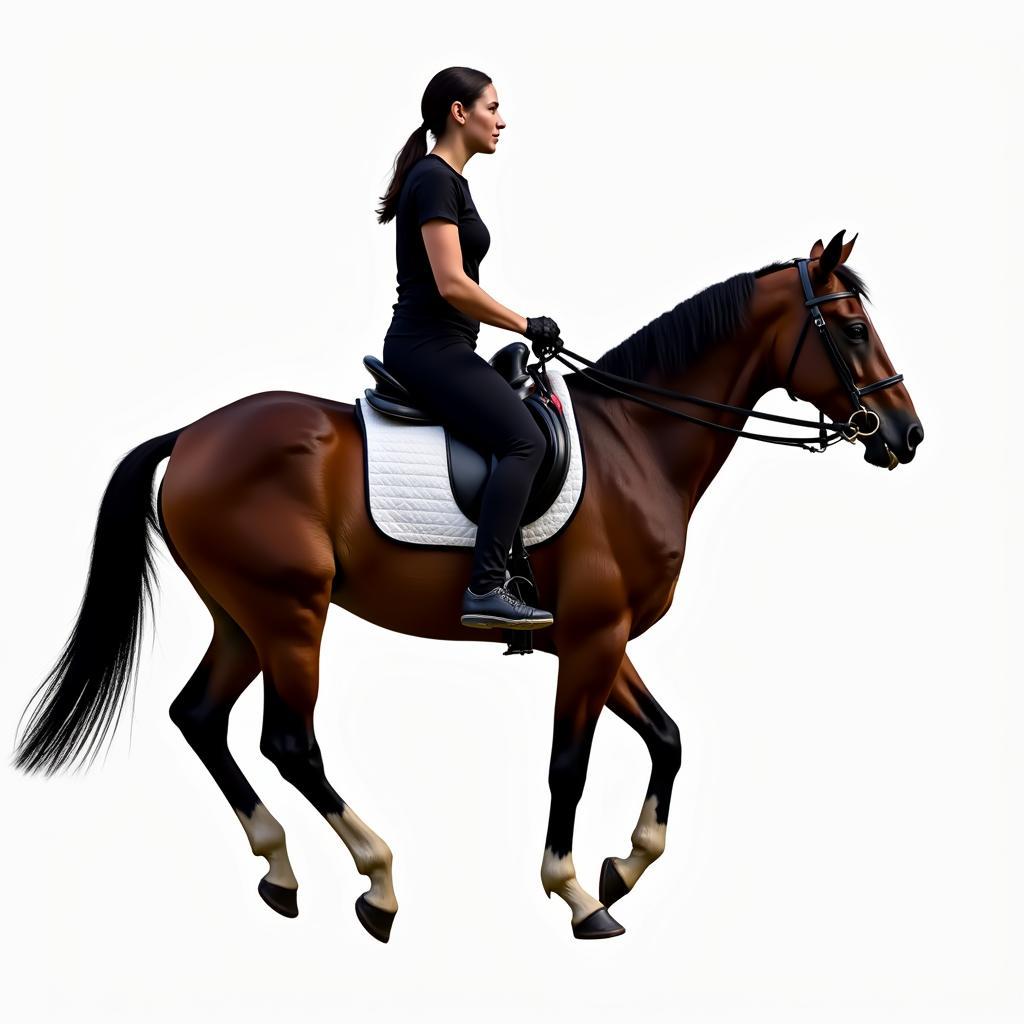Weight restrictions for horse riding are a critical aspect of equine welfare and rider safety, often overlooked by eager enthusiasts. Choosing the right horse based on rider weight ensures a comfortable experience for both horse and rider and contributes significantly to the horse’s long-term health. Ignoring these guidelines can lead to discomfort, injury, and long-term health problems for the horse.
Why Are Weight Restrictions for Horse Riding Important?
A horse’s skeletal frame isn’t designed to carry excessive weight. Too much weight puts undue strain on their back, joints, and ligaments, potentially leading to lameness, soreness, and other health issues.  Horse and rider demonstrating proper weight distribution for comfortable riding. Over time, this can significantly shorten a horse’s working life and cause chronic pain. Just like humans, horses have different builds and strengths, and what one horse can comfortably carry might be too much for another. Weight restrictions aren’t about excluding riders, but about ensuring the well-being of these magnificent animals. If you’re considering a trip with some horseback riding, check out what Bariloche has to offer with horse riding bariloche.
Horse and rider demonstrating proper weight distribution for comfortable riding. Over time, this can significantly shorten a horse’s working life and cause chronic pain. Just like humans, horses have different builds and strengths, and what one horse can comfortably carry might be too much for another. Weight restrictions aren’t about excluding riders, but about ensuring the well-being of these magnificent animals. If you’re considering a trip with some horseback riding, check out what Bariloche has to offer with horse riding bariloche.
How is the Weight Restriction for Horse Riding Determined?
Several factors determine the appropriate weight for a horse, including the horse’s breed, size, build, and overall fitness level. A general guideline suggests that a rider’s weight, including tack, should not exceed 20% of the horse’s ideal body weight. However, this is just a starting point. “Determining the appropriate rider weight isn’t a one-size-fits-all equation,” says Dr. Emily Carter, DVM, an equine veterinarian with over 20 years of experience. “It’s a complex calculation that requires considering the individual horse’s conformation, fitness level, and the type of riding activity.”
What Factors Influence Weight Limits?
Beyond the 20% guideline, factors like riding discipline and terrain also influence the appropriate weight. For instance, a horse participating in strenuous activities like jumping or barrel racing will likely have a lower weight limit than a horse used for leisurely trail rides. Similarly, riding on uneven or hilly terrain increases the strain on the horse, further influencing weight considerations. Have you ever considered horse riding in Wilmington? You should explore the options available for horse riding wilmington nc.
What are the Consequences of Exceeding the Weight Limit?
Exceeding a horse’s weight limit can have several negative consequences, including back pain, lameness, behavioral issues, and decreased performance. Over time, this can lead to chronic conditions requiring extensive veterinary care. “Overloading a horse can cause both immediate and long-term problems,” explains John Miller, a certified farrier with over 30 years of experience. “From muscle soreness and tripping to more serious issues like spinal damage, respecting weight limits is crucial for the horse’s well-being.”
How Can I Ensure I’m Within a Safe Weight Range for Horse Riding?
Communicating openly with riding stables or horse owners is essential. They can provide specific weight guidelines for their horses and match you with a suitable mount. Don’t be afraid to ask questions and be honest about your weight. Your honesty ensures both your safety and the horse’s well-being. If you’re looking for an unforgettable horse riding adventure in a unique location, check out desert homestead horse trails namibia.
 Rider responsibly inquiring about horse weight limits with a stable owner.
Rider responsibly inquiring about horse weight limits with a stable owner.
Weight Restrictions for Horse Riding: Ensuring a Positive Experience
Understanding and respecting weight restrictions for horse riding is fundamental to ensuring the welfare of these incredible animals. By being mindful of these limitations, we can contribute to a safer and more enjoyable experience for both horse and rider. Remember, ethical riding practices prioritize the horse’s comfort and health.
Have you considered a trip to Europe? The Swiss Alps offer a unique backdrop to explore on horseback. Explore what horse riding interlaken has to offer. Looking for something closer to home in the US, you may want to check out horse back riding san antonio.
FAQ
-
What is the general rule for horse riding weight limits? Generally, a rider’s weight, including tack, should not exceed 20% of the horse’s ideal body weight.
-
Why are weight restrictions important for horses? Weight restrictions protect horses from potential injury and long-term health issues caused by carrying excessive weight.
-
What factors determine a horse’s weight-carrying capacity? Factors include breed, size, build, fitness level, riding discipline, and terrain.
-
How can I find out a specific horse’s weight limit? Ask the stable owner or horse owner directly. They are the best resource for this information.
-
What are the consequences of exceeding the weight limit? Consequences can range from muscle soreness and lameness to more severe conditions like spinal damage.
-
What should I do if I’m unsure about my weight in relation to a horse? Always err on the side of caution and ask a professional for guidance.
When you need support, contact us: Phone: 0772127271, Email: [email protected] Or visit us at: QGM2+WX2, Vị Trung, Vị Thuỷ, Hậu Giang, Việt Nam. We have a 24/7 customer service team.